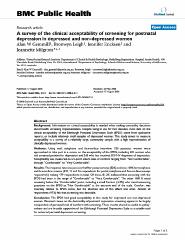Please use this identifier to cite or link to this item:
https://ahro.austin.org.au/austinjspui/handle/1/10218| Title: | A survey of the clinical acceptability of screening for postnatal depression in depressed and non-depressed women. | Austin Authors: | Gemmill, Alan W ;Leigh, Bronwyn;Ericksen, Jennifer ;Milgrom, Jeannette | Affiliation: | Parent-Infant Research Institute Clinical and Health Psychology |
Issue Date: | 17-Aug-2006 | Publication information: | Bmc Public Health 2006; 6(): 211 | Abstract: | Information on clinical acceptability is needed when making cost-utility decisions about health screening implementation. Despite being in use for two decades, most data on the clinical acceptability of the Edinburgh Postnatal Depression Scale (EPDS) come from qualitative reports, or include relatively small samples of depressed women. This study aimed to measure acceptability in a survey of a relatively large, community sample with a high representation of clinically depressed women.Using mail, telephone and face-to-face interview, 920 postnatal women were approached to take part in a survey on the acceptability of the EPDS, including 601 women who had screened positive for depression and 245 who had received DSM-IV diagnoses of depression. Acceptability was measured on a 5-point Likert scale of comfort ranging from "Not Comfortable", through "Comfortable" to "Very Comfortable".The response rate was just over half for postal surveys (52%) and was 100% for telephone and face-to-face surveys (432, 21 and 26 respondents for postal, telephone and face-to-face surveys respectively) making 479 respondents in total. Of these, 81.2% indicated that screening with the EPDS had been in the range of "Comfortable" to "Very Comfortable". The other 18.8 % rated screening below the "Comfortable" point, including a small fraction (4.3%) who rated answering questions on the EPDS as "Not Comfortable" at the extreme end of the scale. Comfort was inversely related to EPDS score, but the absolute size of this effect was small. Almost all respondents (97%) felt that screening was desirable.The EPDS had good acceptability in this study for depressed and non-depressed women. Women's views on the desirability of postnatal depression screening appear to be largely independent of personal level of comfort with screening. These results should be useful to policy-makers and are broadly supportive of the Edinburgh Postnatal Depression Scale as a suitable tool for universal perinatal depression screening. | URI: | https://ahro.austin.org.au/austinjspui/handle/1/10218 | DOI: | 10.1186/1471-2458-6-211 | ORCID: | 0000-0002-4082-4595 | Journal: | BMC public health | URL: | https://pubmed.ncbi.nlm.nih.gov/16914061 | Type: | Journal Article | Subjects: | Adult Cost-Benefit Analysis Depression, Postpartum.diagnosis.psychology Diagnostic and Statistical Manual of Mental Disorders Female Health Care Surveys.methods Health Plan Implementation Humans Interviews as Topic Mass Screening.economics.psychology.utilization Needs Assessment Patient Acceptance of Health Care.psychology Psychiatric Status Rating Scales Residence Characteristics Scotland |
| Appears in Collections: | Journal articles |
Files in This Item:
| File | Description | Size | Format | |
|---|---|---|---|---|
| 16914061.pdf | 257.84 kB | Adobe PDF |  View/Open |
Page view(s)
82
checked on Mar 12, 2025
Download(s)
106
checked on Mar 12, 2025
Google ScholarTM
Check
Items in AHRO are protected by copyright, with all rights reserved, unless otherwise indicated.
